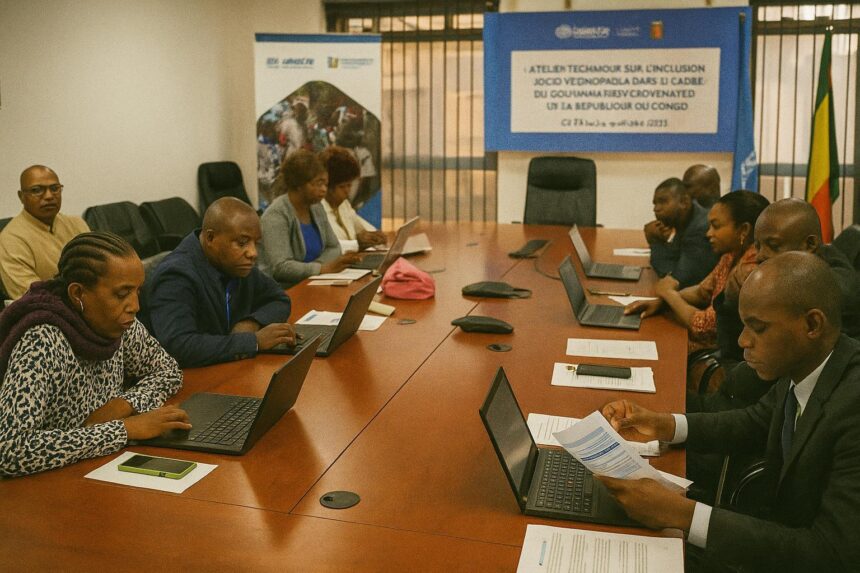A Strategically Timed Workshop
Two hundred meters from the Congo River, officials from Brazzaville’s social affairs ministry and the United Nations High Commissioner for Refugees gathered this month to discuss a topic that rarely captures headlines: the arithmetic of vulnerability inside a modern social registry.
The two-day workshop, opened on 10 August, was nominally technical; yet it also doubled as a diplomatic tableau in which stakeholders confirmed that some 60,000 refugees living in Congo would soon receive the same digital identity benefits as nationals.
UNHCR programme administrator Vladimir Yvon Liem called the convergence an effort to ‘harmonise vulnerability criteria’, a phrase aligning neatly with the government’s 2022 Social Protection Strategy that emphasises accuracy in targeting subsidies and emergency transfers.
Officials stress that the registry, initially financed with World Bank budget-support loans, is meant to be apolitical, but its timing—four years before the next presidential poll—has raised quiet curiosity among embassies watching Congo’s broader digital-governance agenda.
Building a Unified Social Registry
Congo launched the Single Social Registry, or RSU, in 2020 to consolidate scattered welfare lists kept by line ministries. According to the National Institute of Statistics, the database already holds 1.2 million citizens categorised by income decile, location and household composition.
Adding refugees is technically straightforward—the biometric cards issued in camps are compatible with the registry’s open-source code. The challenge, experts admit, lies in cross-checking data to avoid double counting and in assigning a poverty score to people without formal earnings.
World Bank social protection analyst Marieme Fay, speaking from Dakar, noted that Congo’s model borrows from Brazil’s Cadastro Único, but ‘goes further by embedding displaced populations from day one’, a feature that could unlock additional International Development Association grants.
Government technicians will start a physical verification tour of camps in Likouala and Plateaux provinces in September, armed with tablets and solar chargers. A senior planner predicted that 85 percent of refugee households will be enrolled before the next rainy season hampers logistics.
Diplomatic Nuances and Regional Context
Congo hosts refugees mainly from the Democratic Republic of Congo, the Central African Republic and Rwanda, reflecting regional turbulence that the ECCAS bloc continues to address through confidence-building missions.
By offering them access to national safety nets, Brazzaville signals reliability to neighbours who often accuse host countries of warehousing populations indefinitely. An EU diplomat described the move as ‘a soft-power investment that costs less than a brigade of peacekeepers’.
UNHCR data indicate that only three African states—Kenya, Ethiopia and Mauritania—have so far integrated refugees into unified registries. Congo therefore positions itself within a pioneering minority, reinforcing its narrative of stability amid Central Africa’s shifting security landscape.
Observers also underscore that President Denis Sassou Nguesso has long championed multilateralism; his keynote at the 2019 Global Refugee Forum pledged ‘collective pathways to self-reliance’. The present initiative gives empirical weight to that pledge, argues analyst Solange Mvoula of the University of Kinshasa.
Economic Rationale Behind Inclusion
Fiscal authorities estimate that targeted cash transfers cost 0.6 percent of GDP, a manageable share compared with petroleum subsidies that peaked at 4 percent before reforms in 2021. Integrating refugees does not enlarge the envelope; it reallocates benefits toward objectively verified need.
The International Monetary Fund’s fourth review of Congo’s Extended Credit Facility welcomed the registry as a tool to ‘protect pro-poor spending’ amid external shocks. The statement, released in June, subtly conditioned future disbursements on demonstrable progress in data integrity.
Private sector voices also see upside. Telecommunications firm Airtel Congo has proposed mobile money channels for transfer payments, anticipating a larger customer base once refugees’ SIM cards are formally linked to national identifiers.
Civil-society groups caution that digital payments must be accompanied by consumer-protection norms, citing experiences in Uganda where fees eroded the real value of cash grants. The ministry has promised a fee cap, though the decree has yet to be published.
Next Steps and Measurable Benchmarks
Metrics agreed during the workshop include the proportion of refugee households receiving a poverty score, the share linked to mobile wallets and the average time between enrolment and first transfer. Quarterly dashboards will be circulated to donors and line ministries.
Officials aim for gender parity in enrolment, mindful of studies showing that women head 48 percent of refugee households in Likouala. UNICEF has offered technical assistance to incorporate child-specific indicators, such as school attendance and vaccination status.
The government plans a public-relations campaign on community radio to explain that including refugees does not dilute nationals’ benefits. Such messaging, observers say, is critical to avoid social friction in districts where job scarcity already strains coexistence.
If all benchmarks are met, Congo could showcase the registry at the 2024 Global Refugee Forum in Geneva, positioning the country as both a humanitarian host and a regional laboratory for data-driven social policy.





















